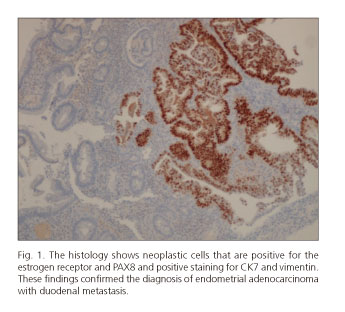My SciELO
Services on Demand
Journal
Article
Indicators
-
 Cited by SciELO
Cited by SciELO -
 Access statistics
Access statistics
Related links
-
 Cited by Google
Cited by Google -
 Similars in
SciELO
Similars in
SciELO -
 Similars in Google
Similars in Google
Share
Revista Española de Enfermedades Digestivas
Print version ISSN 1130-0108
Rev. esp. enferm. dig. vol.109 n.8 Madrid Aug. 2017
https://dx.doi.org/10.17235/reed.2017.4822/2017
LETTERS TO THE EDITOR
A rare cause of intestinal bleeding: duodenal metastasis from endometrial cancer
Key words: Duodenal metastasis. Upper intestinal bleeding. Endometrial carcinoma.
Dear Editor,
We present an extremely rare case of duodenal metastases by lymphatic spread from an endometrial adenocarcinoma; the primary manifestation was gastrointestinal bleeding. We think that this is the first reported case of duodenal metastases from endometrial carcinoma with this presentation.
Case report
A 72-year-old woman was referred for an upper endoscopy due to the presence of melena of a duration of two weeks. The patient had previously undergone a hysterectomy and bilateral adnexectomy due to endometrial carcinoma that was diagnosed five years previously. Full blood counts revealed iron-deficiency anemia. The esophagogastroduodenoscopy showed a highly vascular, ulcerated and vegetating mass in the second part of the duodenum. The abdominal computed tomography (CT) demonstrated the presence of two large soft-tissue lumbar-aortic masses and another one invading the adjacent duodenum. Histological analysis of the duodenal mass identified neoplastic cells which were highly reminiscent of malignant non-keratinizing squamous cell carcinoma. The neoplastic cells were positive for the estrogen receptor and PAX8 by immunohistochemical analysis with staining for CK7 and vimentin (Fig. 1). These findings confirmed the diagnosis of endometrial adenocarcinoma with duodenal metastasis. The patient underwent palliative chemotherapy.
Discussion
Malignant tumors of the small bowel are uncommon and symptoms are frequently non-specific (1). The gastrointestinal tract is rarely involved in patients with endometrial carcinoma (2). Isolated metastases to the small bowel are exceedingly rare and the tumor dissemination could occur via the lymphatic system, usually the para-aortic route as in this case (3). The suspected cause of gastrointestinal bleeding is not usually small intestinal metastasis from endometrial carcinoma due to their rarity (3).
Cátia Leitão, Ana Caldeira and António Banhudo
Department of Gastroenterology. Amato-Lusitano Hospital. Castelo Branco, Portugal
References
1. Schottenfeld D, Beebe-Dimmer JL, Vigneau FD. The epidemiology and pathogenesis of neoplasia in the small intestine. Ann Epidemiol 2009;19(1):58-69. DOI: 10.1016/j.annepidem.2008.10.004. [ Links ]
2. Kurra V, Krajewski KM, Jagannathan J, et al. Typical and atypical metastatic sites of recurrent endometrial carcinoma. Cancer Imaging 2013;13:113-22. DOI: 10.1102/1470-7330.2013.0011. [ Links ]
3. Sadler GJ, Anderson MR, Moss MS, et al. Metastasis from renal cell carcinoma presenting as gastrointestinal bleeding: Two case reports and a review of the literature. BMC Gastroenterol 2007;7:4. DOI: 10.1186/1471-230X-7-4. [ Links ]














